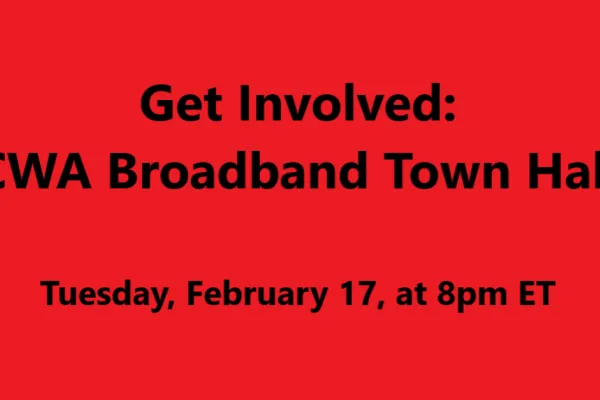NABET-CWA/ABC-DISNEY NEGOTIATIONS 2022 - BULLETIN #11

NABET-CWA/ABC-DISNEY
NEW YORK CITY
BULLETIN #11 - JANUARY 14, 2022
When the parties adjourned the last round of negotiations in New York City in November, the Union’s Network Negotiating Committee (NNC) proposed meeting for the January sessions in Southern California. One goal was for California members to have an opportunity to meet the Union’s bargaining representatives. Unfortunately, the Omicron surge caused ABC to close its meeting facilities on the West Coast, making them unavailable for the meetings. The bargaining committee voted to move the meetings back to New York City, and a majority of our bargaining team has convened in person in New York. Other members of the NNC continue to participate by Zoom in our caucus and the joint negotiating sessions with ABC. Company representatives are participating via Zoom from around the country, with ABC spokesperson Sean Quinn in the New York office.
Over the course of four months and multiple bargaining sessions, the Company’s negotiating team appears to hear our words, but responds largely with indifference to our message. At the beginning of this week, and in an effort to prioritize some open issues, the NNC presented a wide-ranging list of Union proposals which the Company had not adequately responded to. ABC management assessed the list and came back with responses that were a curt “no,” “not interested,” or in some cases “rejected.” Sector President Charlie Braico criticized the Company for this “litany of NOs.” Those few items that were not rejected were in many cases rebranded as the Company’s own proposals and in ABC’s self-interest. The NNC presented ABC’s team with a packaged proposal that would have given the Company considerable scheduling flexibility in exchange for increased scheduling protections for daily hires. Again, rejected! While acknowledging the stress our members face from COVID-19, declining job opportunities in the field, cost of living increases, and lack of job security, the Company proposes solutions that will provide less job security, less rest, stagnating compensation, and vague future job opportunities.
The Committee is sharply focused on issues affecting all daily hires during these negotiations, and a major piece of that focus is our proposal for the Company to convert 100 full-time equivalent daily hires and waivered vacation relief/temporary employees to full staff employees. As a companion piece, the Union is proposing that any long service daily hire, whether hired under this proposal or otherwise, be credited with Total Company Seniority for the years they have been working. The Company finally responded to these proposals with an insulting offer of 40 “staff-lite” positions, with significant protections of the Master Agreement excluded for these individuals. Under the Company’s proposal, these new “staff-lite” employees would receive no credit for their past service, would be exempt from the current seniority system, and would have no “just cause” provision governing the Company’s right to terminate them. “If they have been doing a good job, that is their security,” the Company spokesperson argued. This new Company scheme would create a two-tiered staff system at ABC similar to those that were the subject of recent labor actions at John Deere, Kellogg’s, and Kaiser Permanente. “You are railing against the pillars of unionism,” Local 16’s Bill Bores explained in response. Alex Staherski, a 17-year full-time equivalent daily hire at the Washington Bureau, passionately expressed his outrage at the offer: “as one of the people this would be aimed at, I am offended by this. It’s second-class citizenship!”
Members who work under the Sports Event Agreement constitute a sizeable portion of the daily hire population. These members have been constant contributors to the NNC throughout the bargaining process and their suggestions have been incorporated into the Union’s proposals. We’ve pointed out on numerous occasions to the Company how the current conditions impact members, particularly when it comes to travel pay on which they offered NO INCREASE the first year following ratification, and a $5 increase in subsequent years, while continuing to promote the flawed concept that a travel-only day is not a workday. Responsive to the concerns raised by Sports daily hire members, the Union is pushing for significant increases in the volume of work, uniform wages across all platforms, improvements in travel provisions and compensation for cancelled engagements. The Company has summarily rejected our proposals that would update the Sports Event Agreement and provide members with the benefits and proper compensation we are demanding.
Toward the end of the week, the Company revealed its package of economic proposals, and the Committee was, to put it mildly, underwhelmed. Increases to payments such as per diem, missed second meal penalties, and short turnaround would increase by only a dollar at a time, and would be delayed until a year, or sometimes two, after the contract takes effect. The proposed payment in lieu of benefits (PILOB) increase would be delayed a year as well. The Company has also proposed cutting another hour from each end of the night shift differential corridor and has refused to expand the current brief window during which all daily hires can receive pay for cancelled shifts. Our proposal to increase the number of paid sick days for daily hires was also rejected, with the Company offering no additional days beyond what is already provided for. In response to our reasonable request to add the new Juneteenth federal holiday to the list of holidays, the Company stated that it is unwilling to do so for staff in any form, and will only add Juneteenth for daily hires in exchange for giving up the Friday after Thanksgiving as a holiday. The Company at this point continues to hold firm to its stance that all meals should be a minimum of 30 minutes and unpaid, and further has proposed an actual reduction by several dollars to the payment for opportunities to eat (OTEs), as well as expanding the areas that OTEs can be applied to. The Union remains adamant that OTE payments need to be increased, and that limitations must be put on their usage. To that end, the Union has crafted a simple, cogent definition of what an OTE is: “An opportunity to eat shall be an amount of time sufficient for the employee to break from their work assignment and eat a meal away from the work area.” But again and again this common-sense proposal has been rejected, with little logical explanation. After spending months insisting that many of the Union’s proposals ABC was rejecting would be made up for with the forthcoming larger payments and wage increases, the Company offered a paltry 2% wage increase for each year of the Agreement.
The Union is well aware of the Company’s push to expand its news operations at its local television stations to digital platforms. Numerous online newscasts have been launched or are in the process of being started at KABC, KGO, and WLS. The Union is seeking to address this by expanding the producing fees for Newswriters to cover online newscasts and shows. As in other areas, the Company’s warped view of the workplace has led them to apply the proposal to trim the nightshift differential corridor by two hours. This would reduce the compensation of our dedicated members who regularly write for and produce morning newscasts.
For more than 20 years, the Company has held a bitter vendetta against our Local Union in San Francisco, with Sideletter EN entitled “San Francisco Conditions.” These “conditions” allow the Company to pay our hard-working members at lower rates than are provided elsewhere in the Master Agreement. The Union has repeatedly pointed out that it is time for this vendetta to end, and to treat our San Francisco members equally and with the respect they deserve. The Company continues to rely on an antiquated argument that television viewership is different in San Francisco, while ignoring the fact that the San Francisco Bay Area has the highest cost of living in the country.
The Union has heard our members’ demands loud and clear and will continue to fight for them at the table as we seek to improve our working conditions and increase the compensation to what we rightfully deserve. Please continue to monitor Sector and Local Union websites and check email notices for updates relating to negotiations and mobilization activities.
In Solidarity,
The ABC NABET-CWA Network Negotiating Committee


